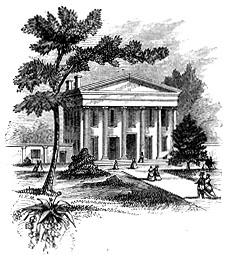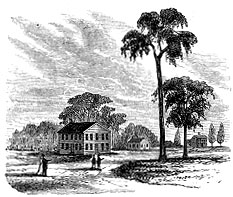 Right: Maplewood Chapel Right: Maplewood Chapel
Congress should recommend such action. In August, 1774, Berkshire set the example of obstructing the King's Courts. In the expedition for the capture of Ticonderoga, in the invasions of Canada, and in Burgoyne's campaign, the town and the county held a place among the foremost in efforts and sacrifices for the cause of liberty. The recommendations of the Continental Congress were followed out with promptness and zeal. A similar spirit was displayed in the relations with the Provincial Government, so far as they affected the carrying on of the war. Yet, from 1775 to the adoption of the State Constitution in 1780, the county was ruled in open resistance to the civil authorities at Boston. Although representatives were sent to the General Court, the acts of that body were accepted merely as advice. The judicial and executive branches of the Government were not recognized. It was maintained that the new Government should originate from the people on the basis of a written Constitution and bill of rights. To this end they "refused the admission of the course of law among them," until their demands should be complied with. Furthermore, the old Courts were objectionable as being costly and cumbersome. They were unpopular for the hardness exercised towards poor-debtors and criminals convicted of trifling offences. In the absence of the usual means of enforcing the laws, the town Governments took in charge the administration of justice, acting either through committees or in town meetings. Public order appears to have been well preserved, and in the condition of business interests the want of civil courts was of little consequence.

School and Parsonage
-- page 5 --
Previous Page | Next Page
|
These pages are © Laurel O'Donnell, 2005, all rights reserved
Copying these pages without written permission for the purpose of republishing
in print or electronic format is strictly forbidden
This page was last updated on
17 Feb 2005